Curated OER
ToxMystery Lesson Plan 2 : Case Book: Catch That Hazard!!!
Students explore toxic hazards. In this personal health lesson, students discover appropriate uses for household chemicals as they identify potentially harmful products in their homes.
Curated OER
How Do Toxins Affect the Human Body?
Students study toxins. In this biology lesson plan, students identify toxins contained within household products and determine specific affects that toxins may have on the human body.
Curated OER
Household Toxic Chemicals
Students take a home toxins survey and determine possible substitutions for household toxins.
Curated OER
Household Acids and Bases
Ninth graders complete an experiment to determine the pH values of a variety of common household substances. They use red cabbage to find the indicator colors of the pH range. They complete a data table that includes a prediction and...
Curated OER
Acute Toxicity: LD50 by the Numbers
High schoolers observe brine shrimp as they are affected by household cleaners, develop observation scale, collect and analyze data, and discuss how household products and pesticides negatively impact environment.
Curated OER
Toxics Lesson Plan
Students discover that chemicals and toxics are all around us and we can make a choice whether or not to use them.
Curated OER
Toxicology 2: Finding the Toxic Dose
Students brainstorm with group partners to decide upon a chemical they would like to test, and outline a procedure for their investigation. They then present in groups their ideas to the rest of the class as well as the chemical they...
Curated OER
The Seeds Tell the Story
Students explore sources of pollution runoff and actions that can be taken to reduce runoff. In this pollution lesson students complete a worksheet and see why bio-essays may provide a more realistic picture of toxicity.
Curated OER
Chemical Engineer
Learners identify toxic household products. In this ecology instructional activity, students research on the health effects, rating and disposal of these products. They rank them based on the danger they pose.
LABScI
The Digestive System: Where Does Food Go?
Would you believe that your digestive system stretches to five times your height?! Help your pupils to understand this relationship as they work through the laboratory exercise. The first instructional activity of a 12-part series is a...
Curated OER
Household Hazardous Waste Reduction
Students discover the different types of hazardous waste. They examine ways to dispose of the hazardous materials safely and without harming the environment.
Curated OER
Toxicology and Living Systems
High schoolers investigate how toxic chemicals affect biological systems. They determine the toxic dose of a chemical that inhibits seed germination in a Brassica rapa. They investigate the effect of environmental tobacco smoke on human...
NOAA
What Killed the Seeds?
Can a coral cure cancer? Take seventh and eighth grade science sleuths to the underwater drugstore for an investigation into emerging pharmaceutical research. The fifth installment in a series of six has classmates research the wealth of...
Curated OER
CONTAMINANT SCAVENGER HUNT
Learners identify substances and activities within a household that contribute to water pollution and identify safe cleaning alternatives for commercial cleaning products.
Curated OER
Safe Subs
Students investigate ways to reduce use of hazardous materials. In this safe substitutes lesson plan, students review hazardous wastes used in many homes and possible safe substitutes for these harmful chemicals. Students write and...
Curated OER
LD50 of NaCl to Gammarus spp.
Students learn the meaning of LD50 through lecture and discussion. Through experiment, students graph and calculate the LD50 of salt on fresh water amphipods. Students compare results of the experiment with pesticides and pollutants.
Curated OER
USA Today Lesson: "Meth" Moves East
Young scholars explore methamphetamine use. In this health journalism instructional activity, students read the USA Today article titled "Meth Moves East", respond to discussion questions regarding the article, and complete an activity...
Curated OER
What is the Best Solution to Dye Easter Eggs?
Students use red and blue litmus paper to determine the category of common substances. They then set up an experiment using vinegar, water, and ammonia (or milk of magnesia) to determine that acids make the best solution for dyeing...
Curated OER
Earth Day Crossword Puzzle-- Difficult
For this science worksheet, students participate in an Earth Day activity by completing a crossword puzzle. Students read each clue. The answer which fits in the puzzle is provided in a scrambled word form. Students unscramble the words...
Curated OER
Water Pollution
Students explore the causes of water pollution. In this environmental lesson plan, students conduct experiments with natural filtration systems.
Curated OER
Petroleum Poisons
Learners discover how harmful petroleum distillates are that are found in the home. They demonstrate how to collect information about consumer products. They also ask their parents about the safety of the cleaning supplies used in their...
Other
Wet in the City: A Recipe for Clean Water [Pdf]
In this hands-on lesson, middle schoolers will examine the labels on common household products to determine what hazardess chemicals they contain, then test less toxic alternatives to see their affects on water quality. Students will...






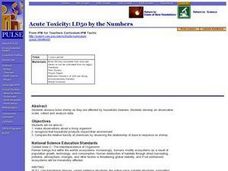


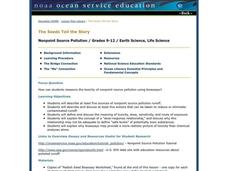

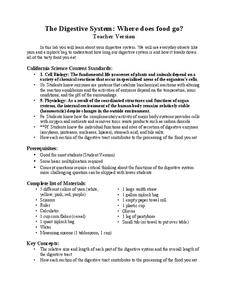
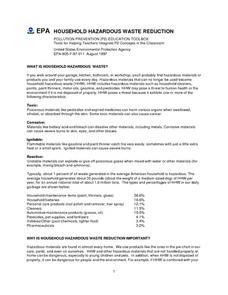





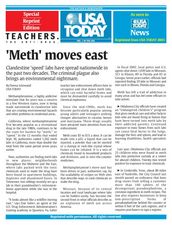




![Wet in the City: A Recipe for Clean Water [Pdf] Lesson Plan Wet in the City: A Recipe for Clean Water [Pdf] Lesson Plan](https://d15y2dacu3jp90.cloudfront.net/images/attachment_defaults/resource/large/FPO-knovation.png)